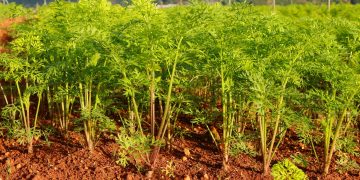A Breakthrough Approach to Improve Crop Health and Postharvest Shelf-Life
Carrots, among the most consumed and economically significant vegetables globally, have long been subject to challenges related to their quality and shelf-life. Addressing these concerns, recent research has unveiled a promising strategy to enhance carrot firmness, reduce skin defects, and boost overall yield through stimulated calcium absorption.
The study, conducted by J. Dodgson, A.K. Weston, and D.J. Marks, explores the efficacy of a calcium fertilizer infused with Levity Crop Science’s LoCal technology, a calcium transport stimulant (MCAS), in optimizing calcium absorption in carrots. The findings showcase remarkable improvements in carrot quality and yield, presenting a significant advancement in agricultural practices.
Initial assessments involved carrots sourced from a UK supermarket, treated with either untreated water or Albina, the calcium fertilizer, with or without the active ingredient. Remarkably, the application of Albina with the active ingredient resulted in significantly fewer skin defects and notably increased firmness five weeks post-treatment.
Further validation occurred through split field trials across grower-managed sites in the UK. Applying Albina at the recommended label rate to select sections of the fields yielded compelling results. Across three carrot trials, the treated sections exhibited substantial increases in harvested weight and average weight, with improvements reaching up to 32% and 33%, respectively.
Moreover, postharvest analysis revealed notable enhancements in firmness, a crucial attribute for both marketability and storage longevity. Carrots treated with the stimulated calcium fertilizer demonstrated firmness increases ranging from 13% to 27% after storage periods of two to four months, depending on the harvest date.
These findings underscore the potential of stimulated calcium absorption in revolutionizing carrot cultivation practices. By augmenting crop health, bolstering yield, and mitigating postharvest concerns, this innovative approach holds promise for enhancing agricultural sustainability and meeting growing consumer demands for high-quality produce.































